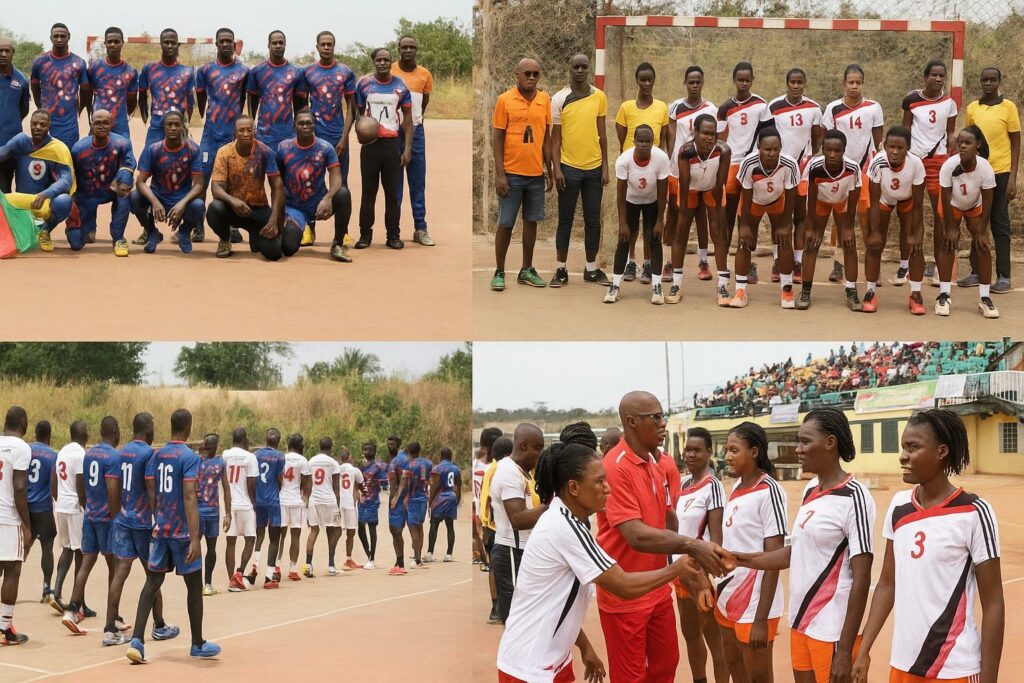Madingou turns into Congo’s handball capital
For ten animated days this September, the normally tranquil streets of Madingou resonate with whistles, chants and the dull thud of resin-coated balls. The Departmental capital of Bouenza, counting scarcely forty-four thousand residents, has welcomed twenty-three senior teams—fifteen men’s and eight women’s formations—from Brazzaville, Pointe-Noire, Pool and the host department to compete in the inaugural “I Love Bouenza in the Literal Sense” tournament. The opening match, held on 8 September 2025 at the city’s freshly refurbished omnisport stadium, was launched by the Prefect, Colonel-Major Marcel Nganongo, under the gaze of Mayor Fortuné Pouéla and a dense crowd of local supporters.
The chosen title of the event echoes a linguistic wink to the dual meaning of “Bouenza”—both a territory and, in Kikongo dialects, a notion of kindness—thereby underscoring the organisers’ intent to bind athletic fervour to civic pride.
A tournament anchored in national sport policy
Colonel Nganongo reminded participants that the competition dovetails with the eighth pillar of President Denis Sassou Nguesso’s social project, which places sport at the heart of youth fulfilment and nation-building. “Bouenza was once the cradle of the Red Devils handball selection; we shall rekindle that flame,” he declared in measured yet confident tones, drawing approving applause from the stands.
In a context where the Congolese Handball Federation has been grappling with governance hurdles and a paucity of official fixtures, the Madingou rendez-vous offers precious game time. Athletes such as seasoned left-back Huguette Kali of Inter-Club confessed that “competing outside training sessions had almost become a memory; this initiative restores our competitive rhythm”.
Cross-departmental cooperation under military stewardship
The organisational architecture rests on a triad of security discipline, civic mobilisation and sporting expertise. Overall coordination is entrusted to Colonel Christelle Colombe Bouaka Milandou, renowned for overseeing athletic affairs within the multidisciplinary club D.G.S.P. and representing Brigadier-General Serge Oboa, whose support was repeatedly saluted by local dignitaries for fostering national cohesion. Avicenne Nzikou, president of Brazzaville’s departmental handball league, provides technical oversight as deputy coordinator. Their combined profiles symbolise the alliance between civilian enthusiasm and uniformed rigour that characterises many successful Congolese sporting undertakings.
In addition to scheduling sixty-four matches across men’s and women’s brackets, the committee orchestrated a motorised carnival meandering through Madingou’s arteries, transforming the city into a temporary festival ground and broadcasting an image of unity beyond the playing court.
Sporting stakes and early favourites
On the men’s side, pundits cautiously tip the experienced Munisport squad and the dynamic collective of Pétro-Sport, whose backcourt tandem has wp-signup.phped the season’s fastest counterattacks, as potential finalists. Yet youthful outfits such as Lion Sport from Nkayi and Tout-Puissant Loutété, buoyed by loud travelling contingents, are keen to upset predictions.
The women’s draw is headlined by the decorated D.G.S.P. roster, flanked by the resurgent Tié-tié Sport from Pointe-Noire and the tactically disciplined Grain de Sel. With round-robin clashes compressed in a tight calendar, endurance and bench depth are expected to be decisive variables.
Socio-economic ripple effects for Bouenza
Local hoteliers report occupancy rates nearing capacity, while informal vendors line stadium approaches with refreshments and handcrafted memorabilia bearing the tournament’s heart-shaped logo. The municipal council projects a modest but welcome increase in tax receipts, illustrating how grassroots sport can translate into immediate micro-economic dividends.
Regional tourism boards, supported by the Ministry of Sports and Physical Education, have seized the occasion to promote heritage circuits to the nearby Malebo Falls and the colonial-era plantations of Loudima, seeking to convert transient supporters into repeat visitors.
À retenir
The first edition of the “I Love Bouenza” senior handball competition gathers twenty-three teams from four Congolese departments, aligns with Presidential sport policy, and momentarily fills the vacuum of national fixtures, while boosting local commerce in Madingou.
Legal and Economic Insight
By framing the event as an inter-departmental friendly rather than an official federation championship, organisers navigate the current governance impasse within the sport’s national structures, avoiding potential conflicts of jurisdiction. Economically, the largely self-financed model—combining prefectural subsidies, private patronage from General Oboa’s network, and modest ticketing—illustrates a sustainable blueprint for regional competitions under constrained public budgets.

